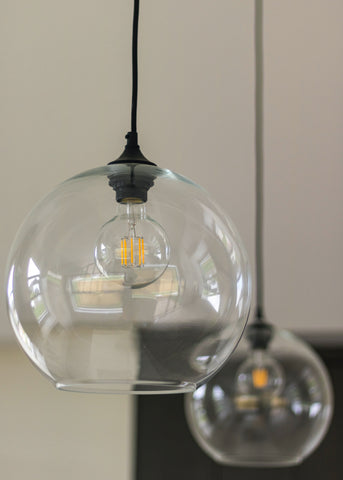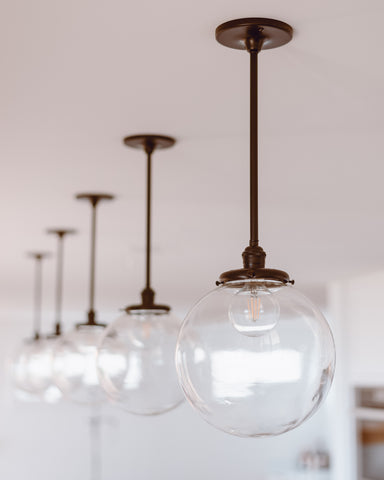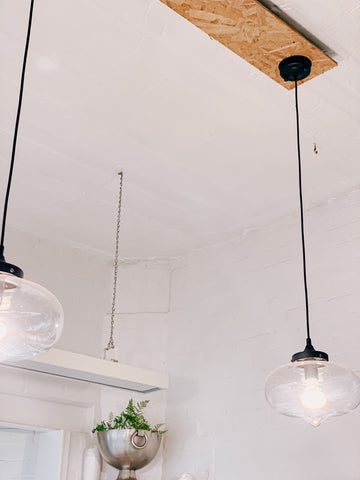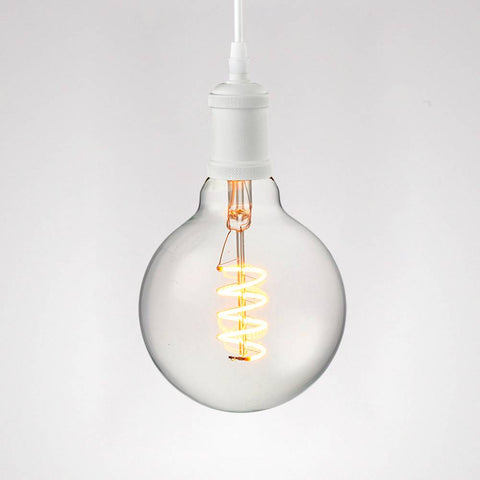Want to spruce up a room? Want to make it look brighter?
Of course, you can redesign it, but a far more cost-effective method is to use pendant lights. If you are wondering what pendant lights are or how to use them, this pendant light guide is just for you.
What is a Pendant Light?

A pendant light, sometimes also called a suspender or drop, is a single light fixture that hangs from the ceiling. Generally, the light fixture is suspended by a metal rod, a cord, or a chain. Pendant lights are frequently hung in a pattern (like a straight line) over dinette sets or kitchen countertops. More and more people have also started using them in the bathroom.
Pendants are available in various materials, like plastic, concrete, or glass. They are also available in a variety of designs and shapes.
Some people think that a pendant and chandelier is the same thing, but that is not so. A pendant involves a single bulb incorporated in one fixture, whereas in the case of a chandelier, multiple bulbs are used in a single fixture.
Where to use pendant lights?
Pendant lights can be used in different ways. You can use them for general lighting, task lighting, and area lighting. Most people use them above a kitchen island, but you can also install them in dining rooms, entry halls, stairwells, family rooms, bedrooms, and kitchens — even in your bathrooms and on porches. You can use pendant lights to highlight paintings, sculptures, and photos, to light up the dining room and narrow hallways, and to sparkle to an indoor space.

What is the size of the space your pendant lights will hang in?
Pendant lights make a statement — but only if you use them correctly. When choosing pendant lights, do take into account the size of the space where you want to install the pendant light.
It is paramount that your pendant lights are neither too big nor too small for your space. Oversized fittings not only restrict vision but also make a room look cluttered. On the other hand, a pendant that is too small will appear insignificant.
Generally speaking, the larger the indoor space, the bigger your pendant light should be.
How to choose a pendant light?
Choosing the right pendant light is not difficult; just follow these four tips.

-
Determine how much light the pendant light must provide
Before you start shopping for a pendant light, you must find answers to some basic, yet very important, questions.
How much light the room needs? Do you have other lighting fixtures installed in this room? What activities you are most likely to perform in this space?
Based on the answers to these questions, you can determine what type of pendant light will be right for you.
It’s no secret that different rooms require different brightness levels. For example, you will want to have more light in a kitchen than in a living room. Also, if you want to install pendant lights in a room which already has other sources of light, like spotlights, then you will likely not use the pendant light as the primary source of light. In such a scenario, you can use a pendant light purely for its aesthetic qualities.
On the other hand, if the room in question does not have any other source of light, you must ensure the pendant light you select gives ample illumination.
-
Decide on the pendant lighting placement
When it comes to pendant lighting, placement is the key. If you place the pendant light too low or too high, that could mess up things.
There are many obvious spaces in the house where pendant lights are likely to look great, like over the kitchen countertop or dining table. They can also spruce up things when hung nicely in a living room or above a bed.
With that said, right placement is absolutely crucial. The last thing you would want is to place a pendant light over the kitchen top only to bump your head on it every time you are cooking. Likewise, pendant light hung too low in the living room could obstruct your viewing of the TV.
Long story short, while installing pendant lights, make sure they are placed in the right place and are neither too low nor too high.
-
Identify the style of the room
If there is one thing pendant lights are very good at, that is making a statement. Most people use them for aesthetic appeal rather than for practical purposes. However, it is important that the pendant lights you select go with the style of your room.
Ask yourself:
- What is my room’s style? Luxe bohemian? Modern minimalist? Industrial chic?
- What is the main colour in the room?
- Are there other statement fixtures or objects in the room?
Understanding the style of your room will help you pick the pendant light that will beautify your space.
-
Decide on the shape and size
The size and the shape of your pendant light should be right. If the pendant light is too big, it could interfere with your line of view. If it is too high, it may not illuminate the room properly.
Types of pendant lights
Pendant lights come in a variety of styles, the following being the most common ones.
-
Multi-light pendant lights:
Need pendant lighting for providing a lot of light? If so, a multi-light pendant light — one which uses several globes — would be perfect for you. -
Shade pendants:
A shade pendant looks like a suspended lamp hanging down the ceiling. The shade, which is no different than a lamp-shade like shade, is made from cloth or other materials like ceramics, glass, or metal. -
Linear pendants:
Want a pendant light to make a statement? Then look no farther than a linear pendant. -
Globe pendants:

-
A globe pendant is exactly what the name suggests: a globe hanging down from the ceiling. These pendants are very popular among proponents of the minimalist design.
Conclusion
Pendant lights can make your room brighter or look smarter. However, it is important that you install them in the right place and make sure they are neither hung too low or two high from the ceiling.
